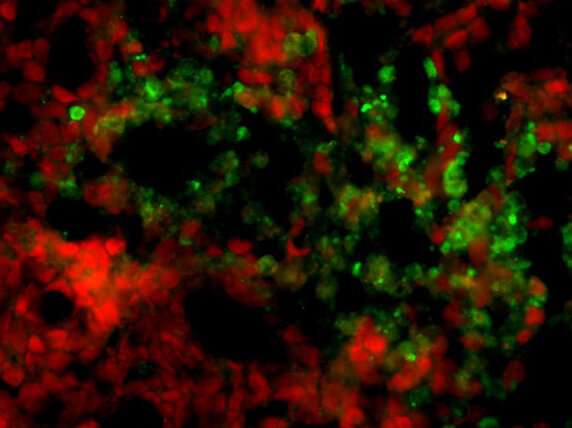A compound effective against chemotherapy-resistant cancer cells identified

A compound effective in killing chemotherapy-resistant glioblastoma-initiating cells (GICs) has been identified, raising hopes of producing drugs capable of eradicating refractory tumors with low toxicity.
Despite longstanding and earnest endeavors to develop new remedies, the prognosis of most glioblastoma patients undergoing chemotherapies and radiotherapies remains poor. Glioblastoma, a malignant glioma, has a median survival period of approximately 15 months. One of the reasons for this is the lack of methods to eradicate its cancer stem cells, or glioblastoma-initiating cells (GICs), that demonstrate tumorigenicity (ability to form tumors) and resistance to chemotherapies and radiotherapies.
In a study published in Neuro-Oncology, the collaborative research group between Hokkaido University, FUJIFILM Corporation, and the National Institute of Advanced Industrial Science and Technology (AIST) successfully cultured human GICs resistant to temozolomide (TMZ), a standard drug used for treating glioblastoma. Next, using Fujifilm's compound library, they conducted a high-throughput drug screening to identify a compound that can specifically kill or inflict damage to GICs, not normal cells such as neural stem cells and astrocytes. The efficacy of the candidate compounds was examined using cytotoxic activities, expressions of various cell markers, and tumor-suppressive activities as indicators.
Compound 10580 was successfully identified as being capable of killing or inflicting damages to GICs. The research group identified that the compound inhibited the activity of dihydroorotate dehydrogenase (DHODH), an essential enzyme for pyrimidine synthesis found in the mitochondria's inner membrane.
While analyzing the compound's efficacy, it was also discovered that the compound decreased the expression of stem cell factors in GICs, unraveling a part of its molecular mechanism. Moreover, the compound was orally administered to tumor-bearing mice, which confirmed its strong anti-cancer efficacy. The mice exhibited no visible toxicity, suggesting that the compound is non-toxic to normal cells.
"Compound 10580 is a promising candidate for developing drugs against glioblastoma and other recurring cancers. Further technological developments of a drug delivery system or 10580 derivatives, which can cross the blood-brain barrier, are needed," says Toru Kondo of Hokkaido University's Institute for Genetic Medicine who led the study.
More information: Echizenya et al. Discovery of a new pyrimidine synthesis inhibitor eradicating glioblastoma-initiating cells, Neuro-Oncology (2019). DOI: 10.1093/neuonc/noz170

















